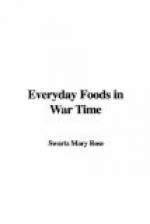CHAPTER VI
FATS AND VITAMINES
In the days of the ancient Romans vegetable oils were prized for food and butter was used for cosmetics. In America today we are asking what is to become of us if we cannot have butter to eat! Such are the fashions in food. “June butter” is one of our gastronomic traditions. The sample in the restaurant may have none of the firm creamy texture and delicate aromatic flavor of the product of the old spring house; but as long as it is labeled butter we try to bring our sensations into line with our imaginations. For the real butter flavor there is no more a substitute than there is for the aroma of coffee. But these are matters of esthetic pleasure rather than of nutrition. They depend largely upon habit. Whale blubber and seal oil are as much appreciated in some quarters as butter is by us. An American going inland from the Atlantic coast is often surprised to find that olive oil, instead, of being served on every table, is exceedingly disliked.
For the sustenance of the body we must recognize that fat is fat, whatever its flavor. A calorie from butter yields neither more nor less energy than a calorie from lard or bacon, olive oil or cottonseed oil. The common food fats are all very well digested if judiciously used—not in too large quantities, nor over-heated in cooking, and not “cooked into” things too much as in pastries, rich sauces, and fried foods. Whether we spread our bread with butter or beef drippings amounts to the same thing in the long run; the main point is which we are willing to eat.




